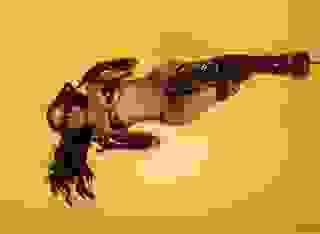Note: You can change font size, font face, and turn on dark mode by clicking the "A" icon tab in the Story Info Box.
You can temporarily switch back to a Classic Literotica® experience during our ongoing public Beta testing. Please consider leaving feedback on issues you experience or suggest improvements.
Click here"Taking care of a few loose ends. If all goes according to plan, I should be along shortly."
"And if it doesn't?"
"It will."
"You're that sure of yourself?"
"I am."
"Must be nice."
"It is."
"You are a real prick, you know?"
"True, but it's always nice to hear it from a true believer. Where will you be stopping for fuel?"
"Newport and Eureka."
"Don't forget about Bodega Bay, and once you get near the Bay Area keep your fuel topped off at all times. Do you have any jerry cans onboard?"
"Six for fuel, six for water."
"Isn't your water-maker working?"
"Things break, Patrick."
"They do indeed. Good for you." And with that the line went dead, leaving C. Llewelyn Sumner alone with his thoughts once again. After passing Whidbey Island the wind filled in and he made sail, reaching along at seven knots just a few hours later, until Port Angeles was off their port beam. He called the fuel dock at Neah Bay and let them know he was coming in, and they advised if he didn't make it before they closed to just tie-off at the pumps.
Traffic was heavy in the main shipping lanes so he kept close to the coastline, and he made it in to Neah Bay just in time to see the lights go out at the fueling station, so he tied off for the night and settled in to sleep off the tensions of the day, only to wake up at four in the morning when a fishing boat came in to offload their catch. He purchased two huge salmon and had them cut up, then he put the chunks in baggies and slid them into the refrigerator, then he topped off his fuel and water tanks again before he left for Cape Flattery.
Where he turned south, skirting the coast to stay well away from the northbound shipping lanes -- only to find that now he had to keep a sharp eye out for felled timbers floating on or just beneath the rough surface. The sonar he'd installed did a fair job or warning him of the logs out to about 300 feet ahead of the boat, so enough time to take evasive action, but that morning was a nerve-wracking walk through a rolling minefield. Soon enough he gave up and turned to go further away from the coast -- if nothing else to get away from all the floating logs.
And as this was, like it or not, his first time "outside" and the further he got from land the deeper the water became, and soon enough the long Pacific swell began to get to him. By late-morning he was leaning over the rail feeding the fish, and it took three Dramamine tabs to knock him out long enough to sleep off the nausea. When he woke in the middle of the afternoon he still had no appetite but did just manage to slice some salmon and feed Tracy, who as always had remained coiled on his lap while he slept.
And as evening came on he went topsides and was stunned by the technicolor sunset beyond the rolling slate gray seascape -- and now the Olympic range was to his east, and for some reason he found that disconcerting. He powered up the radar and set the range to 48 miles and he spotted fishing boats and freighters here and there, but as soon as darkness came on his seasickness returned. The moon wouldn't come up over the Olympics for a few more hours so he did his best to fight the rolling queasiness, and after a few hours the cramps and nausea abated just a little. When the moon finally came up he marveled at the scudding clouds overhead and how they looked like white-rimmed blackness drifting along on unseen currents in the sky, and even with a three-quarters moon out he was amazed by the number of stars he saw, and by how black and empty space looked.
He stayed up all through that first night out, mesmerized by the night sky and his place in the grand scheme of things, and he jumped when a flying fish flew up and landed in the cockpit. Tracy made a quick meal of it and seemed rather pleased with herself. Then, as the sky arced through shades of gray he jumped once again -- this time when the Iridium SatPhone chirped in its cradle beside the chartplotter.
And he wasn't exactly surprised to see Patrick's ID pop up on the screen.
"Well, how did your night go?" the spy asked.
"What? You don't know?"
"Now really, Charles! Do you think I've planted listening devices on your boat?"
"I don't know. Have you?"
Patrick laughed and laughed at that.
"No, well, to the point. Kurt has run another series of simulations, and he now seems rather confident that things will get interesting around the second, perhaps the third. Might I recommend that you and Elizabeth head out the Golden Gate on the first? Perhaps to visit Carmel or Monterrey?"
"If I stop feeling seasick, you mean?"
"Oh dear. Don't tell me..."
"I think this was all a huge mistake, Patrick. There is no way in Hell I'll survive a trip to Polynesia if this keeps up."
"Do you have any over-the-counter GERD medications with you? Like maybe Nexium?"
"Yes?"
"Double up on the dose for two days and see if that doesn't knock it back."
"Okay. I'll give it a try."
"It's the stomach acid, old boy. Your inner ear sends a signal when things get rough out and your stomach goes haywire with the stuff. Shut that down and away goes your mal-de-mer, just like magic. And no orange juice, nothing with heavy acid. That sets it off."
"Okay. How are things on your end?"
"Oh, things are coming along nicely here."
"I can't believe the government isn't taking this seriously, Patrick. It makes no sense."
"Bureaucratic inertia, Charles. It killed Rome and it will be the death of us all."
Sumner sighed. "You know, I'd recently been approached to work up preliminary plans for a new museum of science and technology with that civic center, and I think in a way I was actually excited about taking on a commission like that."
"Oh, really? Why?"
"I'm not sure, but I think in the best possible circumstances such museums ought to be places where people can go for inspiration, to see how the people that came before confronted everyday life and how they went about finding solutions to their most vexing problems."
"And what would you have designed, Charles? Something soaring to the heavens?"
Sumner chuckled. "You know, actually, I was thinking more along the lines of something that might survive a nuclear blast. A place where the people who were rebuilding civilization might go for both inspiration and ideas -- and a sense of safety."
"An underground bunker would do the trick, I suppose."
"Not inspiring enough, Patrick. We need inspiration to excel; anything else is mere survival."
"Did you ever stop to think that there might be times when mere survival is the best we can hope for?"
"No. Not since I realized what a horizontally opposed thumb is good for."
"Oh, Charles. You are an artist, impractical to your core, but I'd hate to go through life without knowing you're out there."
"Why Patrick, is this a compliment?"
"No, Charles, it was a declaration of friendship."
And with that the line once again went dead.
"I'll be damned," Sumner sighed -- as he made his way to the box of Nexium he was sure he'd stored in the aft head.
+++++
Eight days later he sailed under the Golden Gate, and as soon as he was tied off at Pier 39 he fired up his iPhone and called Elizabeth.
"Well, I've made it," he said to his daughter. "When can you come down?"
"Would tomorrow be too soon?"
"No, not at all! Perfect, as a matter of fact! You'll be bringing your friend, I take it?"
So they set a time and Sumner set about scrubbing the boat with scented scrubbing compounds -- anything that would rid the cockpit and cabins of any traces of his lingering bile. The next thing he did was head to a local pharmacy -- where he bought every single box of Nexium they had on their shelves. He got up early the next morning and ran to a grocery store to replenish the larder, but he thought he'd wait another day before stocking up on fresh seafood and produce, then he sat up in the cockpit and waited.
And just before noon Elizabeth came bouncing up to his Hallberg-Rassy, The Silent Wake, and when Sumner looked down to find her vivacious smile he was stunned to see not just a friend from school but also her brother, his son. With their duffels in hand, he was standing by his sister's side, and he appeared quite upset.
Part 4
But they just stood there staring at one another, wondering who would be the first to break the silence.
Charles had never really accepted his father, not since their unforced reunion two years before. And then, after his father financially bailed out Forbes and kept him from losing his house, he'd felt a lingering unease between himself and the old architect -- his father -- and those unsettled feelings had remained an account that he'd never bothered to reconcile. His mother had rarely talked about Sumner, and when she had her comments had been constricted, almost remote generalizations, too abstract for the boy to glean any useful information about the man he'd never met. She'd never put him down, yet neither had she built him up; Tracy had been content to let Sumner's memory wither away into nothingness -- and that vacuum turned out to be fertile ground for the seeds of another fatherless teenager's distrust.
Or, at least she had been content until she grew sick, because at some point she must've realized her brother wouldn't succeed as a parent, and that sooner or later Forbes would have to come to Sumner for help. Yet in the end, she never relented, she never talked to her children about their father, but at least she'd given her brother Forbes the tools he'd need to make contact with Sumner.
Yet because Tracy had never paved the way for a reunion of any kind, this was, perhaps, her final abdication of responsibility to her children. She, in effect, left everything about their father to chance, in the end hoping that Sumner would accept them as his children, but she never let on that her last hope was that Sumner might take them in.
And it was here, in her final abdication, that her lack of trust had defined all their futures. To Charles, it was as if she had she been saying that Sumner was categorically untrustworthy. Or, the boy wondered now as he stared at the man on the boat, had she been tacitly admitting that she'd been wrong about Sumner all along, that she'd never even given him a chance to prove himself as a father, and that as her death approached she regretted her choice? Charles didn't know, couldn't know what had been his mother's thinking, but his father seemed to be an honest, straight-forward guy.
So Charles remained locked inside his mother's abdication, still suffocating under the weight of so many unknowns, yet among all the doubts swirling within the moment was that this was an unexpected chance at reconciliation. In a way, Charles craved the idea of having his father in his life, even if his desire was riddled with doubt.
Yet Sumner recognized something important in the moment when he saw his boy standing down there on the dock with his arms full of duffel bags, so he jumped down to the dock to help shoulder the load. Perhaps it was a small gesture, but even so it was an important one.
"Well, this is an unexpected pleasure," Sumner said to his son as he plucked a duffel strap from the boy's shoulder. "I had no idea you were coming out for a visit."
"A friend of yours," Charles said, "that writer, he called and insisted that I come."
"Really? Did he tell you why?"
"No. He said you'd tell me when I got here."
Sumner nodded, but he said nothing else about the matter. "Well, let's get these things stowed...but Elizabeth? Won't you introduce me to your friend?"
"Sure, Pops. Dad, this is Deni Elliot, she's a third year. Deni, this is, well, Dad!"
He held out his hand. "Deni? Do call me Charles, if you please. But goodness me, won't someone please tell me what a third year is?"
Deni Elliot stepped forward and took Sumner's hand. "Nice to meet you, and I have to say I've been a fan of your work for years. And I just finished my third year of medical school at Davis. I met your daughter in a biochem seminar a few weeks ago and when I learned she was a sailor, well, we've been sailing a few times since then."
"Really? Excellent. I was thinking of taking a quick trip down to Monterey, so I hope that will work out for you."
After their duffels were hauled down below and their sleeping arrangements sorted out, the four walked over the Fisherman's Wharf district and wandered around for what felt like hours, but before heading back to the boat for the evening they stopped off and bought crab and scallops and mountains of fresh shrimp. Once back aboard, Liz and Deni took the forward cabin, leaving Charles to manage in the aft cabin with his father. Sumner was in the galley and had just started rearranging the fridge when his iPhone chirped; when he saw it was Patrick he took the call.
"Hello?"
"It's happening!" Patrick screamed. "Right now!"
And then the line went dead.
Gripped by a sudden overwhelming panic, he slammed the galley fridge shut and went to the breaker board and began throwing switches, then he went to the aft cabin.
"Charles, come with me please," Sumner said before he scrambled up the companionway. When they were both in the cockpit he turned to the boy and tried to remain calm: "There's been a large earthquake up north and a large tsunami may be headed our way. As soon as I tell you, cast off that line, the one forward on the right side."
"So, it's happening?" his son asked.
"Ah, so Patrick did tell you?"
And when his son nodded they both just smiled. Grey always thought of everything, didn't he?
But when he started the diesel both Liz and Deni came darting up the companionway.
"What's up, Dad?"
"I'm afraid it's time to leave. Deni? Would you stand by the aft dock lines? Hold her stern in until I tell you, please." Once the engine was idling smoothly he toggled the bow thruster's joystick and confirmed operation then he flipped on the spreader lights. "Charles? Cast off your lines and make sure all lines up there are safely aboard. Liz? Cast off the spring lines now, would you?" He toggled the thruster again and used prop-walk to push away from the dock, then he looked at Deni. "Okay, lines in now please, Deni," he said gently.
"Dad," Liz repeated, "what's going on?"
"There's just been a large earthquake off Vancouver Island..."
Then he was cut off by an intense, deep rumbling that seemed to come from every direction at once, and he threw the wheel hard to port and continued to use the thruster to push the bow around, but over the next several seconds the air filled with acrid dust, then the overpowering odor of ruptured gas lines fell over the wharf area. Once clear of the encircling breakwater, Sumner turned for the Golden Gate and ran the throttle up to 2300RPM, then he powered up the radar and sonar -- just as a colossal screeching metal-on-metal sound began grinding away the silence; everyone turned and watched as skyscrapers trembled and then leaned drunkenly, and then a slender tower slammed into another and this was, Sumner knew, going to start a chain reaction -- like dominoes falling one into the next and the next. Fires blossomed and then everyone looked up and saw that airliners were turning away from Oakland and San Francisco International, heading away from the heaving earth and the spreading fires. They left the marina breakwater to port and turned towards Alcatraz as explosions filled the air with more and more smoke, and sirens could be heard now coming from all over the city.
"Dad! Look!" Liz screamed, pointing at the Golden Gate Bridge, and he turned to look at their escape route in time to see the north tower rise up out of the sea, just as the south tower fell away in a cloudy, grinding crash. And then everyone watched in horror as the central span simply gave way and fell in a coiling, serpentine heap, instantly disappearing beneath a confused jumble of spreading waves.
"How far away is that?" Charles asked.
Sumner adjusted the range circles on the radar and ran a bearing line: "Just under four miles. Call it a few minutes until the wave gets there."
"How long for us to get there?" Charles cried. "And what'll we do when we get there?"
"Use the sonar, pick our way through the rubble..."
"And what about survivors?" Charles cried. "What'll we do about anyone in the water?"
Sumner just shook his head. "We'll do what we can, son."
And then tsunami sirens started wailing all around the bay. Sumner felt it then, the palpable anxiety his children felt, and he knew it was time to be their father.
Ignoring the roar of skyscrapers collapsing behind them, Sumner pulled up the tide tables on the chartplotter and noted it was slack water, a period of no tidal pull, but that the tides would soon turn and begin rushing out the constriction beyond the collapsed bridge. That, in turn, would collide with the inrushing tsunami, potentially adding to the height of the wave...
And without thinking he pushed the throttle forward a little more, increasing their speed through the water to a little over eight knots, then he looked at the tachometer and pulled the power back a little -- to be on the careful side. But everyone turned again when the sounds of multiple explosions came rolling across the water, and Deni pointed at a growing wall of flames to the northeast, near Vallejo. "Fuel storage depots," she said. "Chevron, I think."
Then Sumner rubbed his eyes when it appeared that Sausalito had just jumped about twenty feet in the air, but then the city as quickly fell straight down -- only to be replaced by the sea. Then they could see police helicopters flying over the ruins all around the little town, and for some reason, Sumner remembered he'd yet to turn on his VHF radio.
"Tsunami warning!" the computerized voice broadcasting on Weather 1 said pleasantly. "Take shelter on higher ground immediately. Tsunami warning, tsunami imminent, first wave now passing NOAA warning buoy 4-6-0-1-3 and approaching from the northwest at 3-3 knots, estimated wave height now 2-5 feet..."
Sumner looked at his depth gauge, noted that it had been holding steady at 59 feet, but now he wondered just how much all that bridge debris might foul their passage over the collapsed bridge. "Charles? In the compartment, there, under the aft deck, you'll find a spotlight. Could I have that, please?" Once he had the light plugged in and turned on, he handed it to Charles again. His son gave a sweep ahead of the boat and already they could see dozens of bodies bobbing about on the surface. "Deni? Would you get ready to deploy the man-overboard gear? Charles? You might stand by on the swim platform in case we need to pull someone aboard?"
"What can I do, Dad?" Liz asked.
"Take the spotlight, check our way ahead. If you see anyone in distress shine the light on them and call them out, let me know."
Soon they were passing the Presidio and the old base was swarming with helicopters loading up VIPs and carrying them somewhere up north, and now more than a few fishing boats were leaving the marinas along the north shoreline...
"Tsunami imminent," the mechanical voice Weather 1 declared. "Tsunami now passing the Point Reyes Light, speed now 3-5 knots and wave height now 2-7 feet above tidal mean. Tsunami warning. Take shelter on higher ground immediately!"
"It's coming in from the northwest," Deni said, "and the depth holds at 60 feet until you hit the north side of the entrance channel; it drops to 29 really fast there. That wave is gonna hit the undersea ridge and my guess is it will probably get a lot taller, but it also sounds like it's gonna hit around Point Lobos and Mile Rocks Light."
"So the wave could lose energy?" Sumner asked.
And Elliott nodded. "Yeah. Maybe. What bothers me is what if part of the wave comes in the Golden Gate? It might start swirling around, you know, like make real big eddies as it squeezes in through the entrance."








